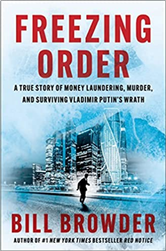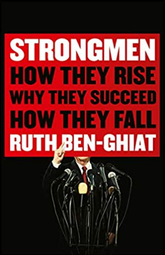|
Our discussion topic for May 2 was Autocrats, Oligarchs and Strongmen. We focused on the many countries that appeared on the verge of democracy over the last twenty years that now are much closer to becoming, or have become, autocracies. We started with a poem called Strongman written by Wyndy, one of our members: strongman he has no wings he walks on his fists rocks rise before him he breaks them their dust blows behind him covering old women The cameo his Mother gave him froze there is no face there its clasp nurses at his throat he devours small animals can’t shit won’t make he wants more always more  At our meeting we focused mainly on two books. The first was Freezing Order, by Bill Browder, which soon after release in April appeared at the top of the New York Times bestseller list. In 1996, Brower moved to Moscow to set up a hedge fund called the Hermitage Fund. He soon found out that the way to do business in Russia was to overlook the custom of profits being siphoned by oligarchs and corrupt officials. Most people accepted this as just a “part of doing business,” but Browder and some of his colleagues, including Russians who worked for him, decided they could not look the other way as investors had funds stolen. Those who try to bring these practices to light in countries with a history of corruption are likely to experience consequences. As Browder tells the story, the Hermitage Fund became one of the best performing funds in the world, but when he fought back he soon found himself a target of Russian law enforcement. Putin declared him a threat to national security and expelled him from the country. Browder closed his business and moved his non-Russian staff to London. In June, 2008, Sergei Magnitsky, a Russian lawyer for Hermitage Fund, noticed that the fund had been reinstated and that it claimed a false $230 million tax refund, which was paid by corrupt officials to themselves from government coffers. When they made this public, Magnitsky, Browder and others were framed as having stolen this money. Funds stolen by Russian oligarchs (and those of other countries) — totaling in the billions — often are held in Western banks after being laundered through a series of accounts in other countries to avoid detection. About half of Putin’s billions is held in the accounts of others. This exposure forced many banks to at last investigate and enforce laws against money laundering. After Magnitsky was beaten to death in a Russian jail for refusing to confess to crimes he didn’t commit, Browder — with a number of colleagues — was able to trace the funds. He then went on a campaign to punish Putin and those oligarchs responsible by convincing the US Congress, and legislators in other countries, to enact Magnitsky acts to find and seize these funds. In retaliation, Putin stopped allowing Americans to adopt disabled children from Russian orphanages. According to the book, this explains the famous meeting between Russian officials and the Trump campaign in 2016 to discuss “Russian orphans,” but really to request that sanctions be overturned. Currently there are Magnitsky Acts in 34 countries; more than 500 individuals and entities have been sanctioned.  Our second book was Strongmen by Ruth Ben-Ghiat, summarized for us by Sharon. It tells the story of Fascism and Communism starting after the First World War in Europe, with fascist strongmen at times receiving American support to defeat left-wing movements. Some future dictators were voted into office. In 1926 Mussolini received a $100 million loan from the US Government, facilitated by a partner of JP Morgan, in his attempt to defeat what was considered a threat from the left. The Nazis under Hitler were the second largest party in Germany in the 1932 elections, after which he was appointed chancellor. In Spain, Franco led a successful revolt against the elected left-wing government that came to power after the 1936 elections. The book then describes dictators who took over governments after World War II, including Mobutu in Zaire, who came to power by an American-backed coup in 1965, and Pinochet, who overthrew the elected government of Allende of Chile in 1973, backed by the US under Nixon who feared communist influence. In more modern times, authoritarians have come to power by use of fraud or voter suppression. When Berlusconi became president of Italy in 1994, he was backed by corporate power and flaunted the democratic process, essentially declaring himself above the law. When Putin came to power in 2000, he began to overthrow democratic norms by shutting down news agencies that dared criticize him, and soon began poisoning his enemies. Trump took advantage of White resentment by the use of racist comments as he won the Electoral College in 2016, despite a loss of the popular vote. Among the tools used by strongmen are a promise to return to a time of national greatness, projecting masculine power as a key to national prominence, emphasizing crises that may or may not exist that only he can alleviate, use of propaganda and smears against opponents, illegal practices such as directing traffic to their own businesses or having their family involved in government, and actual or threatened violence against those who dare voice criticism, especially the press. According to the book, countering authoritarianism requires a commitment to accountability of laws and human rights. Support of dictatorships, such that of Saudi Arabia by the US, sends the wrong message. We must stand against illiberal rule, or governments that claim to be democratic while violating the rights of many for popular support. We make this choice by supporting leaders who stand for real democracy. Your comments and thoughts always are welcome. Also, don’t forget to look at our blog site: renewingdemocracy.org Please recommend this newsletter to people who you think might appreciate it. If you want to be added to the list to receive each new newsletter when posted, fill out our contact form and check the box just above the SUBMIT button. You may also use that form to be removed from our list.
Visit our Books page for information about purchasing The Future of Democracy, The Death of Democracy, and Truth & Democracy. Click ↓ (#) Comments below to view comments/questions or add yours. Click Reply below to respond to an existing comment.
0 Comments
Your comment will be posted after it is approved.
Leave a Reply. |
 5th edition now available 5th edition now available
Steve ZolnoSteve Zolno is the author of the book The Future of Democracy and several related titles. He graduated from Shimer College with a Bachelor’s Degree in Social Sciences and holds a Master’s in Educational Psychology from Sonoma State University. He is a Management and Educational Consultant in the San Francisco Bay Area and has been conducting seminars on democracy since 2006. Archives
July 2024
Categories |
 RSS Feed
RSS Feed